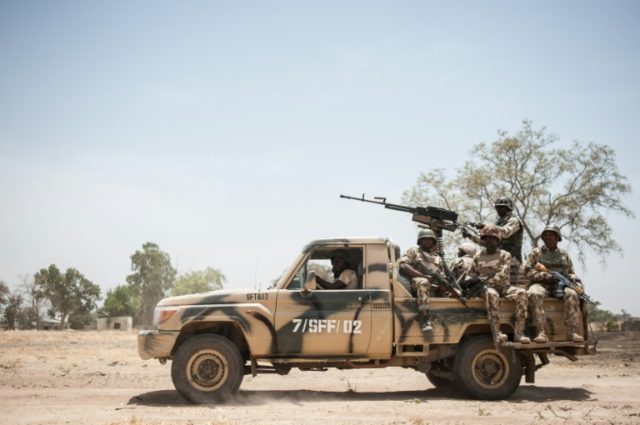Abuja (AFP) – Regional and Western powers were on Saturday urged to do more to stop the threat from Boko Haram, as the UN voiced concern about its ties to the Islamic State group and the militants’ threat to African security.
Nigeria invited leaders of its neighbours Benin, Cameroon, Chad and Niger to Abuja, whose troops will be deployed as part of a much-delayed 8,500-member regional force to combat the Islamists.
But delegates were told that despite major gains since the last security summit two years ago in Paris, more needed to be done to eradicate the group and tackle the root causes of extremism.
Britain’s Foreign Secretary Philip Hammond said “much more besides” a military strategy and a coordinated regional force was needed.
Countries hit by the violence had to win “the hearts and minds of those terrorised by Boko Haram” as the conflict was “a generational struggle against an evil that will destroy us if we do not destroy it”.
“We must sustain this fight until evil is defeated and good prevails,” he said.
US Deputy Secretary of State Anthony Blinken also said “victory on the battlefield is not enough” and a “sustained and comprehensive approach” was required, from tackling extremist ideology to reconstruction.
In particular he said treating former Boko Haram fighters and suspects with dignity and in line with human rights obligations, after repeated accusations of abuses against civilians and Boko Haram suspects.
“These efforts can address the drivers of extremism that helped give rise to Boko Haram in the first place”, said Blinken, warning that otherwise “Boko Haram 2.0… rises from its ashes”.
– IS links –
Nearly seven years of violence in northeast Nigeria has left at least 20,000 dead and displaced more than 2.6 million people in one of the world’s most brutal conflicts.
The UN Security Council on Friday expressed “deep concern” at Boko Haram’s threat to security in West and Central Africa and “alarm at… linkages with the Islamic State”, which operates in Syria, Iraq and Libya.
Boko Haram’s shadowy leader Abubakar Shekau pledged allegiance to his IS counterpart Abu Bakr al-Baghdadi last year, although there has since been little evidence so far of direct support on the ground.
Chad’s President Idriss Deby highlighted the threat from Libya, which has long been seen as a source for arms and explosives smuggled into the Sahel region, which is facing multiple threats from jihadi groups.
Deby’s French counterpart, Francois Hollande, said because of Boko Haram’s links to IS and its status as “the world’s deadliest terrorist group”, it “remains a threat” and no-one should drop its guard.
Boko Haram has been pushed back in the last 15 months to remote border areas on and around Lake Chad, whose waters form the border between Nigeria, Cameroon, Chad and Niger.
The new Multi-National Joint Task Force (MNJTF), which has African Union backing and is based in Chad’s capital N’Djamena under a Nigerian general, was supposed to have deployed last July.
Plugging gaps and improving coordination between armies that are currently operating largely independently is seen as vital when it is eventually deployed, as regional borders are notoriously porous.
– ‘Food crisis’ –
There have been increasing signs of military assistance from Western powers for training, intelligence-sharing and equipment in recent months, indicating greater confidence in Nigeria’s government.
But Buhari said more was required to help development the Lake Chad region, estimating that 960 million (just over $1 billion) was required in the short- and medium-term.
US ambassador to the UN Samantha Power, who visited northeast Nigeria and northern Cameroon last month, said 9.2 million people in the wider region were affected by the conflict.
Hollande said France last year gave 17 million euros in aid and it was “vital that the international community does more”, announcing the creation of a specific “Lake Chad Initiative” through the country’s development agency.
Two million Nigerians have been internally displaced and are currently living in host communities or camps, with little prospect of an immediate return to their homes.
Homes, businesses, schools, medical facilities, government offices, power and telecommunications infrastructure, water sources and land in the mainly agricultural region have all been destroyed or damaged in the fighting.
The government of Borno state — the worst-hit by the violence — has said the displaced face a “food crisis” and $5.9 billion (5.1 billion euros) was needed to rebuild shattered infrastructure.

COMMENTS
Please let us know if you're having issues with commenting.